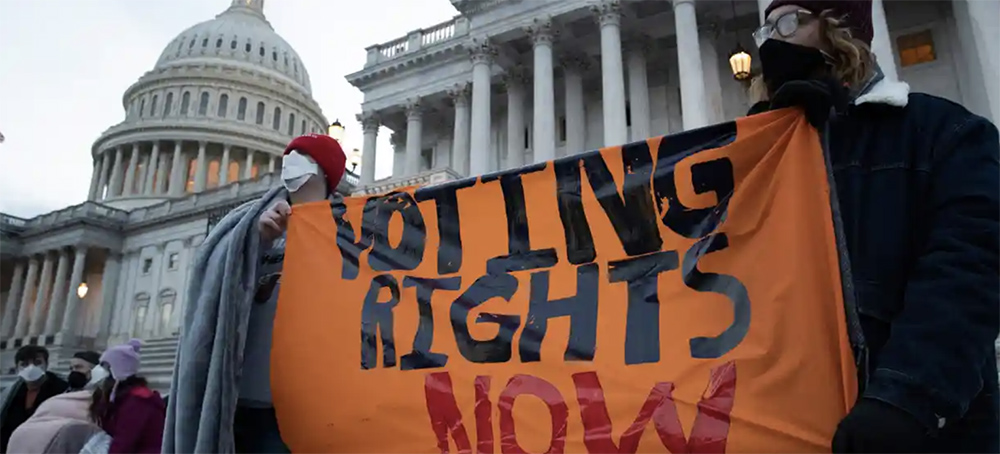The Fight for Federal Voting Rights Legislation Is Far From Over
Jared Evans Guardian UK Activists hold a sign that reads 'Voting Rights Now,' at the steps of Capitol Hill on Wednesday. (photo: Michael Reynolds/EPA)
24 January 22
Activists hold a sign that reads 'Voting Rights Now,' at the steps of Capitol Hill on Wednesday. (photo: Michael Reynolds/EPA)
24 January 22
The Freedom to Vote: John R Lewis Act would restore key voting rights provisions and protect American democracy. We can’t give up
Arguably the most crucial measure of the Voting Rights Act of 1965 was section 5’s pre-clearance requirement that states with a recent history of voter discrimination get approval from the justice department before implementing voting changes. However, the US supreme court’s 2013 decision in Shelby County v Holder struck down the pre-clearance requirement claiming that voting conditions for racial minorities had improved and that its use was outdated. Since then, numerous states passed laws they had previously abandoned due to the threat of pre-clearance. Other states continued to enact laws restricting voting that were already under way before Shelby. These statutes are so restrictive they would have never seen the light of day if pre-clearance was still intact. New voter suppression laws in Texas, Georgia and Florida are the most recent examples of these efforts.
The Freedom to Vote: John R Lewis Act (FTV) – which combines two previous bills to defend voting rights and democracy more broadly – would restore the section 5 pre-clearance provisions and create protections against the most common obstacles faced by voters.
Those of us on the frontlines in the fight for voting rights know the immediate impact these bills would have on our communities. Last year in Iberia parish, a rural community on the Louisiana Gulf coast that is one-third Black, election officials closed eight polling locations – five of which were in predominantly Black neighborhoods. Voters were not properly notified of this change and, even more troubling, the closures were implemented just weeks before an election. At least 20,000 voters were affected, many of whom did not discover their polling location had changed until they arrived at the location they had been voting at for years. Under FTV, election officials would be required to publicly announce all voting changes at least 180 days before an election, allowing voters adequate time to become familiar with their new polling location, secure child or adult care, and notify their employer, if necessary.
In Texas, FTV would immediately reduce the challenges voters of colors face. Nearly all the population growth from 2010 to 2020 in Texas was from communities of color, yet the map that the state legislature enacted reduced the number of districts in which voters of color make up the majority of eligible voters. If FTV were enacted, the redrawing of districts would be the responsibility of a non-partisan redistricting commission that would prevent elected officials from choosing their own constituents. States would also not be able to enact racially discriminatory maps without first submitting them for approval to the DoJ.
Mississippi, the state with the largest percentage of Black voters, offers no opportunity for early voting and voters must get documents notarized to vote by mail. When every voter is forced to vote in-person on election day, it often leads to long lines at polling sites and heavy traffic. When voters are forced to get signatures on both the application to vote by mail and the ballot itself, it is especially difficult for elderly voters who often live alone to have their ballot counted.
In 2020, this requirement’s burden increased dramatically due to the pandemic, particularly for the elderly, whose increased vulnerability to Covid meant attaining these necessary signatures risked exposure. During the 2020 general election, elderly Mississippians were forced to risk their health to vote in person on election day, unless they met the standards for one of the limited qualifications that allowed someone to vote by mail. FTV would require all states to have at least 15 consecutive days of early in-person voting, including two weekends, giving voters in states like Mississippi another option to cast their ballot.
Without pre-clearance, states and localities will continue to suppress votes by enacting restrictive voting changes that target voters of color. While we still have section 2 of the Voting Rights Act, which prohibits voting practices that dilute minority voting strength, this measure is reactive, meaning advocates can only challenge a voting change after its implementation. However, section 2 was also weakened by the supreme court in 2021 by creating new and additional atextual burdens to the Voting Rights Act’s primary mechanism for challenging voting laws that have a discriminatory result. Until pre-clearance is restored, discriminatory changes will continue to be enacted – and will affect every election. The Senate must act to protect the fundamental right to vote and pass federal voting rights legislation by any means necessary – before it is too late.



